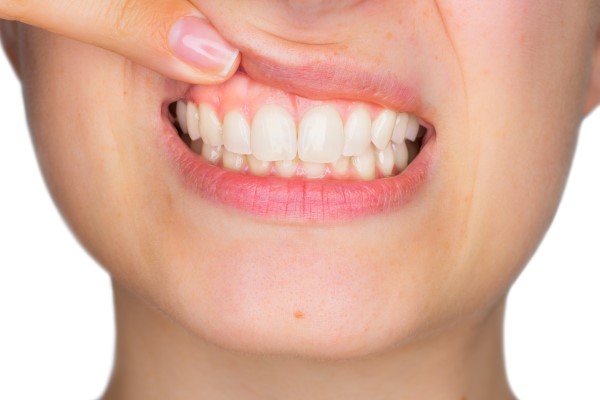How Gum Disease Can Also Affect Your Teeth

Gum disease can cause some severe issues with teeth, including eventual teeth loss if gum disease is left untreated for too long. Fortunately, through in-office treatment and good oral hygiene practices at home between visits, patients can treat and prevent gum disease and protect their teeth long-term.
Reviewing how gum disease can affect your teeth
The gums (and underlying jawbone) are the support system for teeth. They hold the root of the teeth securely. Subsequently, if the gums or jawbone is damaged by gum disease, then it can cause the teeth to become loose or fall out over enough time, in addition to other potential concerns with teeth that gum disease can cause.
What is gum disease?
Gum disease, also called periodontal disease or periodontitis, is an oral health disease that damages the gums and underlying bone. Periodontitis refers to a more progressive form of gum disease, and gingivitis a milder (yet still concerning) case of gum disease. Gum disease is typically the result of consistent acidic attacks caused by bacteria and particles from food and drinks and the build-up of plaque and tartar along and below the gum line.
Gum disease and its effect on teeth
The underlying jawbone, the gums, and the teeth are all interconnected. Any damage to the gums and jawbone could put the health of teeth in jeopardy as well. The dangers of leaving gum disease untreated include:
- Tooth infection
- Teeth sensitivity
- Loose teeth
- Teeth loss
Many times patients ignore the seriousness of gum disease as it does not cause discomfort. However, the failure to treat gum disease can (and most likely will) lead to teeth loss at some point.
The early signs of gum disease
Of course, receiving treatment for gum disease first starts with a diagnosis. While some symptoms require an oral examination and dental X-rays during a dental check-up, patients can check for some symptoms regularly at home. The primary symptoms of gum disease include:
- Gum swelling
- Bleeding gums
- Gum pockets
- Gum recession
- Bone loss in the jaw
Dentists conduct an assessment of the patient’s periodontal health on every visit and conduct regular X-rays to ensure any symptoms of gum disease are detected as early as possible.
How to prevent gum disease between check-up visits
Of course, prevention is a much better strategy for dealing with gum disease than treatment. By practicing good oral hygiene, limiting the consumption of foods and drinks that may contribute to gum disease, and visiting the dentist regularly, gum disease can often be avoided. Be sure to speak with the dentist about ways to prevent gum disease while in between check-up visits.
Schedule a check-up visit for your periodontal health today
If you have any early or progressive symptoms of gum disease, then reach out to our dental team today to schedule a check-up visit. During your first visit, we can examine the status of your gum health and teeth and put together a treatment plan to deal with any oral health concerns you may have.
Are you considering gum disease treatment in the Saratoga Springs area? Get more information at https://www.mysaratogadentist.com.
Check out what others are saying about our dental services on Yelp: Gum Disease in Saratoga Springs, NY.
Recent Posts
Gum disease is a common yet serious oral health issue that can cause discomfort, damage, and even tooth loss if left untreated. With the right gum disease treatment, patients can not only stop the infection in its tracks but also restore the patient's overall oral health. Knowing the true impact of gum disease and how…
Most people have experienced seeing red on the bristles of their toothbrush, or a pink tint in the sink when they expectorate after brushing. It is normal to feel a bit of concern when noticing blood in the mouth because bleeding gums are a symptom commonly associated with gum disease. However, while chronic bleeding gums…
Dentists recommend proper oral hygiene from a young age to achieve good dental health for a lifetime. This is important for cosmetic reasons, but also to maintain overall health. One of the consequences of not brushing and flossing correctly is gum disease, which is also known as periodontal disease. This condition originally affects the gums,…
Periodontal disease, or gum disease, can be incredibly concerning and lead to other, more severe oral health issues if left untreated for an extended amount of time. Consequently, it is important to fully understand the various signs and symptoms of periodontal disease in order to be able to spot periodontal disease as soon as it…


